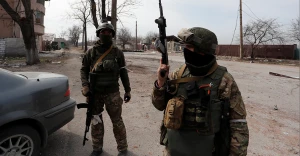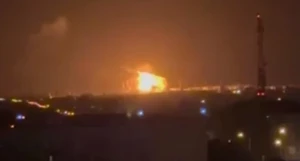
Science and war on frontier
For centuries, Ukraine had to survive on the border with aggressive invading communities, so its wise scientists had to either emigrate or serve the invaders. The new situation of existential challenge calls for a rethinking of the role of basic science, expansion of state support for natural and exact sciences
The latest news is that according to the report of the National Academy of Sciences of Ukraine, 14.4% of scientists of the Department of Mathematics left war-torn Ukraine, and another 5% became internally displaced persons, many scientists died at the front, and research facilities in Kyiv, Kharkiv, Sumy, Mykolaiv, Dnipro, etc. were terribly damaged. At the same time, there is reason to believe that in some disciplines, mainly natural sciences, the percentage is even higher, and it is mainly the younger generation. The chances that they will return are zero.
In this space, it is customary - and not without reason - to criticize the chronic underfunding of science and, at best, the haphazard policy toward it. However, it seems quite logical that it was the war and the inadequate rules of entry and exit abroad that primarily stimulated the "great exodus," which may well have catastrophic consequences.
“The war and inadequate rules of entry and exit abroad stimulated the "great exodus" of physicists, biologists, and mathematicians from Ukraine, which could have catastrophic consequences.”
And this moment makes us think about what chances science had in principle in Ukraine. Because if you look at the conditions for the development of natural science in general, it seems that we had nowhere and no way to learn how to handle our science. It's true that officials are clumsy, and society is generally indifferent, but a rational scientific approach suggests that we look for reasons somewhere else besides the stereotypical "people are stupid and lazy," especially since stupidity and laziness are also somewhat relative.
And here, before we get into specifics, it is worth making an important clarification. From now on, we will be talking mainly about natural and technical specialties. In the humanities, the situation is different - in this case, the specialist is mostly "held by the sources," in other words, an important factor for him or her to return, and if possible not to leave, will be the opportunity to continue working in local archives, libraries, museums, sociological laboratories, etc. Second, humanities is relatively "cheaper". Thirdly, the realities of the war have actualized, in particular, the topics of history, language, and literary studies, and, therefore, there are more and more opportunities for part-time work in the form of consultations, writing popular texts, etc. Of course, this does not apply to all specialties, but in general, the window of opportunity is quite wide.
“Ukraine, having been on the front lines for the past almost 1,000 years, has had extremely deadly circumstances and conditions for potential scientists. Our Newtons and Cavendishes were facing death, escape, or service to the invaders”
And now let's get back to natural science, which is the first to flee the war. And here I have a question: how long has it been, for example, a thousand years since there have been no hostilities on the territory of Ukraine? My colleague and I once started counting, and we never came to a consensus, but it became obvious that a few decades passed quite peacefully in the context of war. And here it is appropriate to compare, for example, with Britain, where modern natural science actually began to take shape. Starting in the seventeenth century, Britain waged wars outside its territory. The war returned directly to the territory of the island nation only during World War II. Instead, in Britain itself, in particular, a gentry class was formed - a closed club of financially independent small and middle-class nobility, many of whom chose intellectual pursuits as their hobby. Another option, more common in continental Europe, was monasteries. Let me remind you that Roger Bacon was a monk. And gunpowder, according to legend, was invented by the monk Berthold Schwarz around 1313.
What was happening in the days of Newton and Cavendish? Newton lived in 1642-1727, and Cavendish in 1731-1810. Do you remember? For Newton, if he had been born in Ukraine, it would have been an achievement not to die as a child or teenager during another punitive operation, such as those organized by Prince Jeremi in 1648 or Stefan Czarnecki in the 1660s, or simply not to die from another plague, which were common during the wars of early modern times. Then he would have spent his entire youth either fighting relentlessly or hiding in monasteries from the vicious cycle of history. Also, one should not forget about the option of being taken into captivity if one was destined to live closer to the steppe frontier.
In fact, the only option for a conventional Ukrainian Newton not to disappear as a scientist was to get to a quieter place, find a noble and wealthy patron, and try to engage in "related work" in Skovoroda's terms. For the conventional Cavendish, the only way to make it as a scientist was to join the Russian imperial service and make a generous contribution to the treasury of Russian science.
“Wise Ukrainian men and women became the centerpiece of the achievement lists of Russian/Soviet imperial science, or were forced to work in the United States or France”
All of the above is quite well confirmed by the examples of those European scholars who were unlucky enough to be caught in the whirlwind of European history. For example, François Viéte died in a duel, and Antoine Lavoisier was guillotined. Many German scientists, such as Euler, did not mind being in the service of the St. Petersburg monarchs, because it was difficult for them to realize their potential in science in their own homeland, which was fragmented and torn apart by wars. And in later times, let me remind you that Albert Einstein, Enrico Fermi, and Stanislaw Ulam were forced to leave for the United States, and there they created the atomic and hydrogen bombs at Los Alamos.
For intelligent Ukrainians in the Naddnipryanshchyna (territory on either side of the middle course of the Dnipro River), the imperial service was practically the only chance to make a career in the natural or exact sciences. We can still see the consequences in the form of a kilometer-long list of people from Ukraine who have become the jewels of non-Ukrainian science, or when reading about the Ukrainophobia of the inventor and designer of helicopters, Kyiv-born Igor Sikorsky.
The only exceptions are medicine and sciences related to biology and, to some extent, chemistry (what an irony of history!). Everyone has heard of Danylo Zabolotnyi and Ilya Mechnikov. But, besides them, there is also Theodosius Dobzhansky, one of the founders of modern genetics, who proved the absolute falsity of racial theories in the 1930s. Another case is the discoverer of chemosynthesis, a native of Kyiv, Serhiy Vinogradsky. But all of them had to end up in the United States or France to achieve their brilliant results.
Other exceptions, such as the brilliant physicist Ivan Puluj or the mathematician Myron Zarytsky, are exceptions to the rule. Moreover, the situation in western Ukraine was even worse, as the Polish formula of the 18th and 19th centuries was about a "nation of peasants and priests" was in effect here, i.e., the most simplified social structure of a dependent nation that only later had to emancipate itself.
So, paradoxically, natural science was able to develop in any way only under the conditions of the empire, as the empire provided the necessary material base and stability. Of course, in its own interests, which was especially evident in the USSR. Where did the goals, directions of development, and communication between institutions and industries take place before 1991? In Moscow, yes. At the republican level, including in Ukraine, tasks were carried out that were "sliced" from the union center, using resources allocated by the same center.
Personnel capable of thinking strategically, determining directions, communicating, and so on, were sent to the center. Only a few remained in the field. There was also fierce competition for resources, like between humanities and natural sciences. This is normal for a totalitarian empire, but it is wild for a national state.
“Ukraine, even after thirty years of independence, still needs to develop a reasonable idea of why we need science and what specializations we need to develop and why we need to develop them”
In addition, all Soviet science, let me remind you, worked for the military-industrial complex, and humanities was an appendage to the "only true doctrine." Anything that did not serve the needs of the military-industrial complex was either starved or repressed - just remember the fate of genetics. After the declaration of independence in 1991, the focus on the military-industrial complex "hung in the air." And somehow no one, speaking of "preserving science," thought to ask the question: where is our truly basic science, and where are the industries that serve the military-industrial complex of the fallen empire? Not to mention developing a reasonable idea of why we need science and what kind of specializations and why exactly? However, this also requires thinking about oneself as a subject, understanding one's own purpose and, accordingly, strategic goals and tactical measures to achieve these goals. As a post-colonial, and in our case, post-genocidal community, we have a very difficult time with this.
In addition, science has been and continues to be affected by the paradigm of survival, which encourages allocating resources only to what gives practical returns in the short term. Basic science is not one of them.
What is the conclusion? No, "let's not cry for what is not going to happen anyway, because of our geography." On the contrary, let's decide what we need and why we need science. And this includes defense, agriculture (do we all remember the panic about feeding Africa last year?), reconstruction, energy, including nuclear power. The list goes on. And all of this requires chemistry, physics, materials science, biochemistry and biophysics, genetics, and many more disciplines and specializations within them. So, even though the frontline is annoying us with its disgusting side, we will have to form science on the frontier.
Specially for Espreso.
About the author: Olesia Isayuk is a historian, Doctor of Humanities, researcher at the Center for Research of Liberation Movement and the National Museum-Memorial of Victims of the Occupation Regimes, or the Prison on Łącki Street, a researcher of Nazi and Soviet repressions in the 20th century.
The editors do not always share the opinions expressed by the authors of the blogs.
- News












































